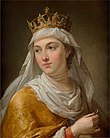1399
| Millennium: | 2nd millennium |
|---|---|
| Centuries: | |
| Decades: | |
| Years: |
| 1399 by topic |
|---|
| Leaders |
| Birth and death categories |
| Births – Deaths |
| Establishments and disestablishments categories |
| Establishments – Disestablishments |
| Art and literature |
| 1399 in poetry |
| Gregorian calendar | 1399 MCCCXCIX |
| Ab urbe condita | 2152 |
| Armenian calendar | 848 ԹՎ ՊԽԸ |
| Assyrian calendar | 6149 |
| Balinese saka calendar | 1320–1321 |
| Bengali calendar | 806 |
| Berber calendar | 2349 |
| English Regnal year | 22 Ric. 2 – 1 Hen. 4 |
| Buddhist calendar | 1943 |
| Burmese calendar | 761 |
| Byzantine calendar | 6907–6908 |
| Chinese calendar | 戊寅年 (Earth Tiger) 4096 or 3889 — to — 己卯年 (Earth Rabbit) 4097 or 3890 |
| Coptic calendar | 1115–1116 |
| Discordian calendar | 2565 |
| Ethiopian calendar | 1391–1392 |
| Hebrew calendar | 5159–5160 |
| Hindu calendars | |
| - Vikram Samvat | 1455–1456 |
| - Shaka Samvat | 1320–1321 |
| - Kali Yuga | 4499–4500 |
| Holocene calendar | 11399 |
| Igbo calendar | 399–400 |
| Iranian calendar | 777–778 |
| Islamic calendar | 801–802 |
| Japanese calendar | Ōei 6 (応永6年) |
| Javanese calendar | 1313–1314 |
| Julian calendar | 1399 MCCCXCIX |
| Korean calendar | 3732 |
| Minguo calendar | 513 before ROC 民前513年 |
| Nanakshahi calendar | −69 |
| Thai solar calendar | 1941–1942 |
| Tibetan calendar | 阳土虎年 (male Earth-Tiger) 1525 or 1144 or 372 — to — 阴土兔年 (female Earth-Rabbit) 1526 or 1145 or 373 |

Year 1399 (MCCCXCIX) was a common year starting on Wednesday (link will display the full calendar) of the Julian calendar.
Events
January–December
- January – Timur the Lame captures and sacks Haridwar.
- February 3 – John of Gaunt, uncle of King Richard II of England and father of Henry Bolingbroke, dies.
- March 18 – Richard II of England cancels the legal documents allowing the exiled Henry Bolingbroke to inherit his father's lands.
- July 4 – While Richard II of England is away on a military campaign in Ireland, Henry Bolingbroke, with exiled former archbishop of Canterbury Thomas Arundel as an advisor, returns to England and begins a military campaign to reclaim his confiscated lands.
- August 6 – Prince of Yan (Zhu Di) of China starts a rebellion in Beijing.
- August 12 – Battle of the Vorskla River: Mongol Golden Horde forces, led by Khan Temür Qutlugh and Emir Edigu, annihilate a crusading army led by former Golden Horde Khan Tokhtamysh, and Grand Duke Vytautas of Lithuania.
- August 19 – Richard II of England is taken prisoner upon his return from Ireland.
- September 29 – Having regained his father's lands, Henry Bolingbroke is urged to take the crown from the unpopular Richard II of England. Parliament charges Richard II with committing crimes against his subjects and eventually forces him to abdicate.
- September 30 – Parliament accepts Henry Bolingbroke as the new king of England.
- October 13 – Henry IV of England is crowned.
- October 19 – Thomas Arundel is restored as Archbishop of Canterbury, replacing Roger Walden.
- November 1 – John V, Duke of Brittany begins his reign.
Date unknown
- Faraj succeeds his father, Barquq, as Mamluk Sultan of Egypt.
- Sultan Bayezid I of the Ottoman Empire invades Mamluk-occupied Syria. A rift forms between Sultan Bayezid and Timur of the Timurid Empire, who also wanted to conquer Syria.
- Ladislaus regains the throne of Naples, after overthrowing King Louis II.
- King Jogaila becomes sole ruler of Poland, after the death of his co-ruling wife, Queen Jadwiga.
- Abu Said Uthman III succeeds Abdullah, as ruler of the Marinid dynasty in present-day Morocco.
- The Principality of Achaea (now southern Greece) resists an invasion by the Ottoman Empire.
- Traditional foundation date of the Kingdom of Mysore in India, which survives until 1950.
- Iuga becomes prince of Moldavia
Births
- March 16 – Xuande Emperor of China (d. 1435)
- June 26 – John, Count of Angoulême (d. 1467)
- date unknown
- William II Canynges, English merchant (approximate date; d. 1474)
- Zara Yaqob, Emperor of Ethiopia (d. 1468)
- Rogier van der Weyden, Dutch painter (or 1400)
Deaths


- January 4 – Nicholas Eymerich, Catalan theologian and inquisitor
- February 3 – John of Gaunt, 1st Duke of Lancaster (b. 1340)[1]
- March 24 – Margaret, Duchess of Norfolk (b. c. 1320)
- July 13 – Peter Parler, German architect (b. 1330)
- July 17 – King Jadwiga of Poland (b. 1374)
- August 12 – Demetrius I Starshy, Prince of Trubczewsk (in battle) (b. 1327)
- August 15 – Ide Pedersdatter Falk, Danish noblewoman (b. 1358)
- August 26 – Mikhail II, Grand Prince of Tver (b. 1333)
- September 22 – Thomas de Mowbray, 1st Duke of Norfolk, English politician (b. 1366)
- October 3 – Eleanor de Bohun, English noble (b. c.1366)[2]
- October 5 – Raymond of Capua, Italian Dominic friar and venerated Christian (b. 1330)
- November 1 – John IV, Duke of Brittany (b. 1339)
- date unknown
- Spytek z Melsztyna, Polish nobleman
- William le Scrope, 1st Earl of Wiltshire (b. 1350)
- Sultan Barquq of Egypt
- Trần Ngung, former ruler of Trần dynasty Vietnam (forced to commit suicide)
- Stephen I of Moldavia
References
- ^ "John of Gaunt, duke of Lancaster | English prince". Encyclopedia Britannica. Retrieved June 26, 2020.
- ^ "Eleanor de Bohun, Duchess of Gloucester". Westminster Abbey. Retrieved March 18, 2019.
